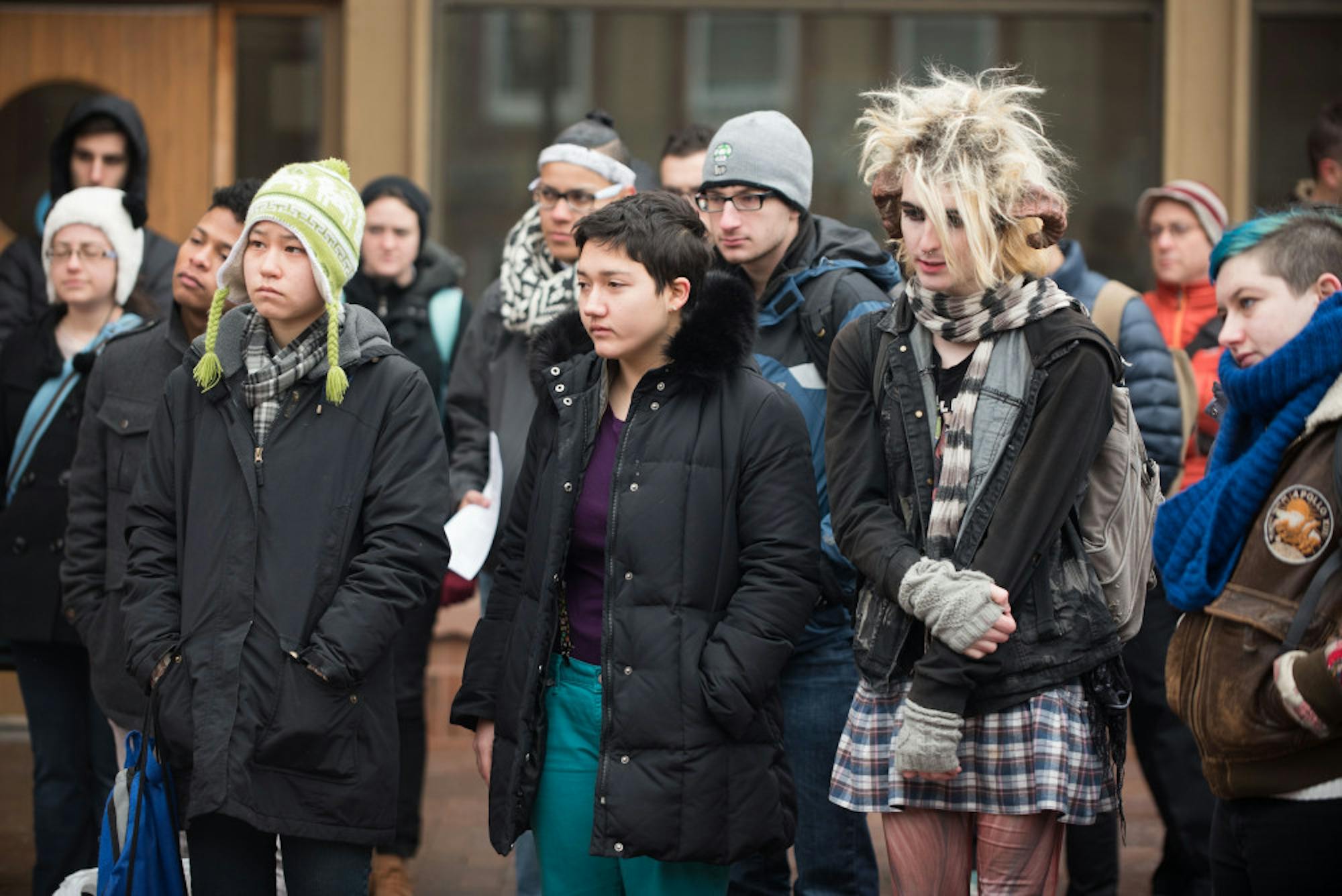Tufts students gathered at the Mayer Campus Center's lower patio on Wednesday to speak out against transphobia, conversion therapy, gay/trans panic defense and institutionalized hatred.
The rally, titled "Enough is Enough: Rally for Trans Rights," was sparked by the suicide of transgender teen Leelah Alcorn in December, Jaquelyn Hyde, a first-year who organized the rally, said.
Several students, as well as Director of the Lesbian, Gay, Bisexual and Transgender (LGBT) CenterNino Testa, shared statements about their experiences as LGBT or gender non-conforming students.
Rally organizer Taylor Strelevitz explained that sharing personal stories was an important way to raise awareness.
“The statements were intended to share a breadth of different experiences and to really be an opportunity for people to use those experiences to inform and contextualize Leelah’s death and then use that to fuel further action,” Strelevitz, a senior, said.
Though prompted by Alcorn’s suicide, Hyde explained that the rally was meant to bring to light the many forms of violence, including conversion therapy, that have caused Alcorn and many other transgender people to end their lives.
In his speech, Testa described such forms of violence as "terrorism" because they cause members of the LGBT community to feel extreme fear and shame in their own communities.
“Leelah is not just a figure, a trope, an icon; she was a person, and we failed her,” Testa told the crowd. “We didn’t offer her the world she deserved, and we will never know what she could have offered us. It is necessary to sit with the discomfort of the loss.”
According to Strelevitz, the rally was also intended to raise awareness about the transphobia that occurs on the Tufts campus.
“Transphobia exists here. It isn’t isolated to the Bible Belt or some random town in the middle of nowhere, it’s happening on our campus, it’s happening to people here and it’s really relevant,” she said.
Strelevitz, Hyde and senior John Kelly, all of whom spoke at the rally, discussed their own experiences with name-calling and gender-related slurs on campus.
“I don’t walk down [Professor's] Row anymore,” Kelly said, “which makes it hard to get to Medical Services.”
Health Services is one of a number of obstacles that transgender students face at Tufts, Hyde explained. According to Hyde, almost no gender surgeries are covered by the health care plan Tufts offers to students, and hormones are only covered in very specific situations. They also said that the policy regarding gender surgery was unclear.
“I sent some emails back and forth to the office. What I got back was … 'just type into the website "gender surgery" and see what you can find.' I’m not really sure how to describe that kind of response beyond, I suppose, crass and dismissive,” Hyde said.
On a more day-to-day level, Hyde said that changing preferred pronouns within Tufts’ systems is extremely difficult, which can lead to some uncomfortable situations in the classroom.
“Its difficult to inform your professor ahead of time what pronouns you want them to use, but at the same time you can’t exactly comfortably raise your hand in the middle of a class of 200-some-odd people and say ‘excuse me, you just referred to me with the wrong pronouns,’” they said.
Hyde explained that in order to avoid this situation, students must go to 200 Boston Ave. and ask to have an email sent to their professors. According to Hyde, simply going through this process can be very stressful, adding that there is no distinct procedure for changing pronouns throughout all of Tufts’ systems.
“On one hand, purposely misgendering someone and referring to them with the wrong pronouns is a form of harassment, but at the same time there is no way to specify the right pronouns after you have matriculated,” they said.
Strelevitz emphasized the necessity of improving Tufts' ability to support transgender students by offering adequate medical services, recognizing preferred gender pronouns and providing ubiquitous gender neutral housing and bathrooms.
“What’s especially upsetting is that Tufts had been lauded as one of the best in terms of trans-friendly health services in terms of college campuses, and then to hear a story like [Hyde's] just shows how low the bar has been set,” Strelevitz said.
Beyond Tufts, Strelevitz and Hyde hope to see an end to conversion therapy, gay/trans panic defense and LGBT hatred, as well as a changed attitude about transgender and gender non-conforming people.
According to Hyde and Strelevitz, changing day-to-day interactions is essential to ending transphobia. These changes in attitude go beyond simply being aware of preferred pronouns, Hyde explained; they include eliminating assumptions about gender, combating heteronormative stereotypes and changing beauty standards for women and trans women alike.
“Being a good ally is far beyond the step of correcting pronoun usage and not being directly transphobic,” Strelevitz said. “It's volunteering for organizations, it's putting your money where your mouth is and donating, it's being there and being friends with people. It goes so much farther than getting the names right.”
Correction: According Michelle Bowdler, senior director of health and wellness service, Tufts health insurance does include many health benefits for trans individuals, including surgical options.
Students rally against transphobia, declare 'enough is enough'

Students listen to Tufts senior John Kelly speak during the Enough Is Enough Rally for Trans Rights on the Lower Campus Center Patio on Jan. 14.





